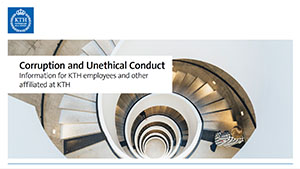Secondary employment
Employees of government agencies are subject to special rules for secondary employment. KTH counts basically anything that you, as an employee, engage in outside your employment and which does not relate to your personal life as secondary employment, regardless of whether such activity generates any income.
As an employee, you may not have any secondary employment that is not permitted, in other words, that may
• shake the confidence in your or any other employee’s impartiality in the work
• damage the agency’s reputation
• present an obstacle to your work
• compete with the activities of KTH
As a KTH employee, you must report any secondary employment upon request, providing any information that KTH needs in order to assess such secondary employment. Certain employee categories have an increased obligation to report any secondary employment. Examples of such categories are teachers and managers. KTH may decide that you must cease to engage in or not undertake secondary employment.
Learn more about secondary employment in the Guidelines regarding secondary employment at KTH .
The form for reporting secondary employment can be found on the forms archive web pages (blankettarkivet), below the header "Arbetstid och Bisyssla".
How do I know?
As an employee, you are responsible for deciding whether to undertake an engagement. You must be clear on whether the secondary employment in question relates to the area of the agency or not. As a teacher, you have greater freedom to accept engagements within the framework of your particular subject of expertise. However, engaging in competitive activities, such as commissioned training currently or previously provided by KTH, is not permitted.
If you accept an engagement, you must continuously check whether a conflict of interest may have arisen due to changes in the nature of the duties of your employment or your engagement. It does not need to actually be established that you have been or risk becoming partial in a particular matter, or that the public’s trust in you or in the government agency has actually been reduced, in order for a secondary employment not to be permitted. It is sufficient that there has been reason for the public to question your objectivity.

